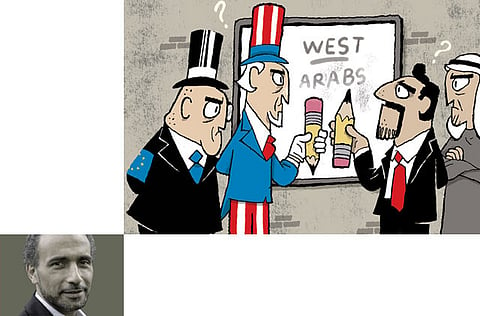Need for a reset in western view
No longer is the American-European prism the only valid one

The relationship between Muslim-majority countries and the West is crucial and involves a number of major issues. The complexity of ideological and political relations and, above all, the phenomenon of attraction/repulsion can be observed both among politicians and intellectuals and among ordinary citizens. We certainly need some renewal of this relationship.
Historically and ideologically, the ‘West vs Islam’ dichotomy has been constructed through a process both fraught and complex. To this day, it shapes perceptions of East and West at both extremes of the binary equation. There can be no substitute for frankness: A constant and implicit (and often explicit) feature of the relationship has been the imbalance of power and, as Malaysian thinker Chandra Muzaffar correctly notes, brute force. There can be no substitute for confronting the question of justice and peace between civilisations and ideologies, of power and force, directly. If recent evolution in the Middle East has demonstrated nothing else, this much it has made clear. The US and Europe, their governments and their intellectuals, continue to view the Arab world and Muslim majority societies as former colonies, as historical (and financial) debtor nations, as countries that must be kept in a state of ideological and economic dependence in order to protect the vital interests of the North. It is all well and good to talk of a multi-polar world, of the pluralism of civilisations, cultures and religions, to celebrate equality and peace, but it must be acknowledged that the terms of the relationship are as unequal as they are unfair — not only economically, but also ideologically and symbolically — and that they have kept the Global South and the Islamic Orient in a state of dependence and domination. Nothing, in the recent uprisings and their consequences being witnessed today, appears to challenge this reality in any meaningful way.
The presence of the US and Europe casts a shadow over the debate on political and economic issues, whose outcome will determine the future of every country in the Arab world and in Muslim majority societies, dictatorships or not. These issues, ranging from the role of the state and of the military or of international institutions like the World Bank and International Monetary Fund, hark back in one way or another to the relationship with the West, to the question of independence and of how the wealth of nations is to be managed. The stakes are both too numerous and too high for western countries — the same countries that have been setting ideological priorities, controlling mineral resources and economic policies in the East — to allow genuine, autonomous democracies to emerge. Western power will neither easily nor happily be challenged. What may bring the West to revise its relationship with the Arab and Muslim-majority world will be, first and foremost, a shift in the centre of gravity of the world economic order. Time will pass before this can come about.
Judging by the way the Arab uprisings have unfolded with instability everywhere (from Syria to Egypt after the Coup d’Etat and to Tunisia with the announcement of new presidential election), that day is indeed far off. Yet, there is no alternative. Relationships must change and change they will, in the medium or long term. The arrival on the scene of new political and economic forces makes renewal inevitable, not only because of the different interests now involved, but also because of the very nature of these forces. China, India, Russia, Brazil, South Africa or Turkey’s relations with the Arab world and with Islam are quite different from that of the West’s. This is not to say that relations are uniformly fine, as evident in the repression of the Uighurs in China’s Xinjiang province in 2009, the conflict in Chechnya (as well as the ongoing internal problems) along with Russia’s ruthless decades-long policy of repression or the massacre of Muslims in Gujarat, India, by Hindu nationalists in 2002. There can be no room for idealisation: Several of the emerging powers are not democratic at all (China), while others are experiencing severe democratic deficits (India, Russia) resulting in repressive or discriminatory domestic policies in which Muslims are often but not exclusively the victims.
There is little significant impact, however, on the way these countries approach Middle East issues. The need for sharper focus on Islam’s relations with the East and the Far East in the coming decades will undoubtedly have a major impact on its relations with the West. Nor can Japan’s recent and deepening interest in Islam and the eastern question be overlooked. The facts are there for all to see: No longer is the American-European prism the only valid one. Intellectuals and the media in China, India, Russia and Japan (and in the Western Hemisphere and Latin America) understand the Middle East, its sense of itself and its aspirations quite differently from the West. The clouds of upheaval are gathering on the horizon.
Tariq Ramadan is professor of Contemporary Islamic Studies in the Faculty of Oriental Studies at Oxford University and a visiting professor at the Faculty of Islamic Studies in Qatar. He is the author of Islam and the Arab Awakening.


